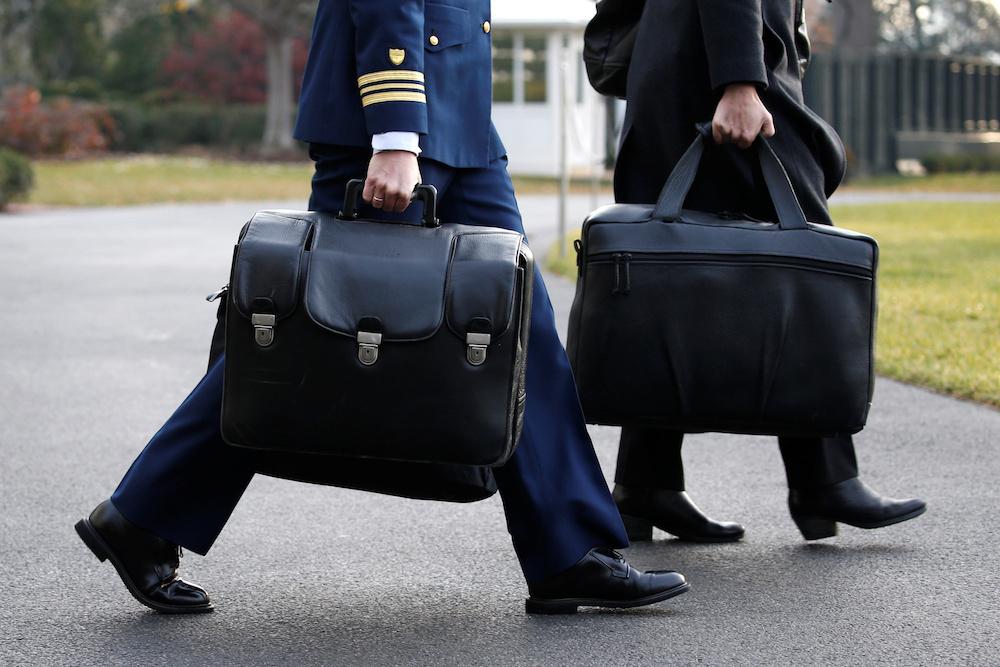Fallout fears: A Chinese newspaper’s illustrated guide to nuclear war
A military aide carries the so-called "nuclear football," which contains launch codes for the U.S. nuclear arsenal and which travels with the sitting U.S. president, to depart with U.S. President Donald Trump for travel to Utah from the White House in Washington, U.S. December 4, 2017.
A state-run newspaper in a Chinese province bordering North Korea published a list of tips on Wednesday for how civilians can protect themselves in the event of a nuclear attack.
The apocalyptic article comes as tensions soar on the Korean Peninsula over Pyongyang's nuclear ambitions.
A full-page illustrated advisory in the Jilin Daily, an official publication of the northeast province, instructed readers to close their doors and windows and thoroughly wash their belongings to minimize radioactive impact.
"Modern warfare is three-dimensional, and intercontinental missiles could hit any corner of the world," the newspaper said.
While the publication does not explicitly mention North Korea, Jilin was one of the Chinese provinces where people reported feeling tremors after Pyongyang conducted a powerful nuclear test this September.
Last week Pyongyang fired an intercontinental ballistic missile that it said could hit anywhere on the US mainland.
In China, the authoritarian regime's largest trade partner and sole major diplomatic ally, concern has grown in recent months that North Korea's expanding weapons program will cause residual damage along the border.
China's environmental protection ministry performed eight days of emergency monitoring following the September blast, which the North claimed was the successful detonation of a hydrogen bomb.
Authorities concluded that radiation levels remained normal in the four provinces where tests were done, including Jilin.
In something reminiscent of the Cold War era, the Jilin Daily used a colorful comic Wednesday to tell readers to wear masks and take iodine tablets to prevent radioactive iodine from collecting in their thyroid glands.
To remove radioactive contamination on the body, one should vigorously wash garments and swab the ears, nose and mouth, the paper advised.
Xu Yucheng, a deputy director for Jilin's Civil Air Defense Office, told the Beijing News that the newspaper's goal was to "strengthen national defense education."
Compared to Japan and other developed countries, Xu said, the public education on "ordinary national defense" in China is "still not sufficient."
An editorial in the Global Times, a state-run nationalistic tabloid, sought to calm what it called a "storm of conjecture" that the nuclear attack advisory has aroused on Chinese social media.
While conflict on the Korean peninsula is not unavoidable, the editorial said, "China must prepare for the worst. Both the country and its people should heighten vigilance."
Beijing has backed a slew of sanctions on Pyongyang that include bans on imports of North Korean coal, iron ore and seafood.
But the Chinese government fears taking any tougher action could cause the regime to collapse, triggering a refugee crisis across its border with the North and eliminating a strategic buffer separating China from the US military in South Korea.
Beijing has proposed that the North suspend missile and nuclear tests in exchange for a suspension of US-South Korean military exercises, a suggestion Washington has repeatedly rejected.
The World is an independent newsroom. We’re not funded by billionaires; instead, we rely on readers and listeners like you. As a listener, you’re a crucial part of our team and our global community. Your support is vital to running our nonprofit newsroom, and we can’t do this work without you. Will you support The World with a gift today? Donations made between now and Dec. 31 will be matched 1:1. Thanks for investing in our work!
